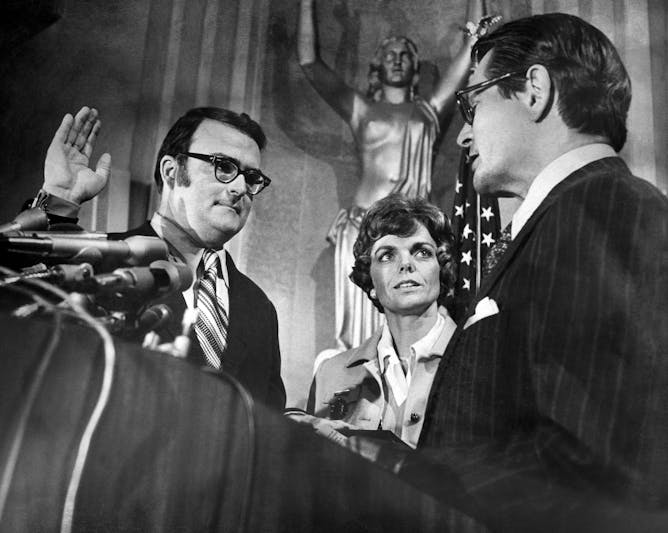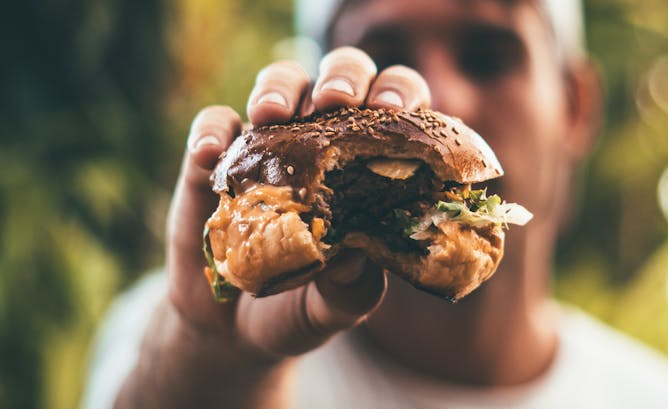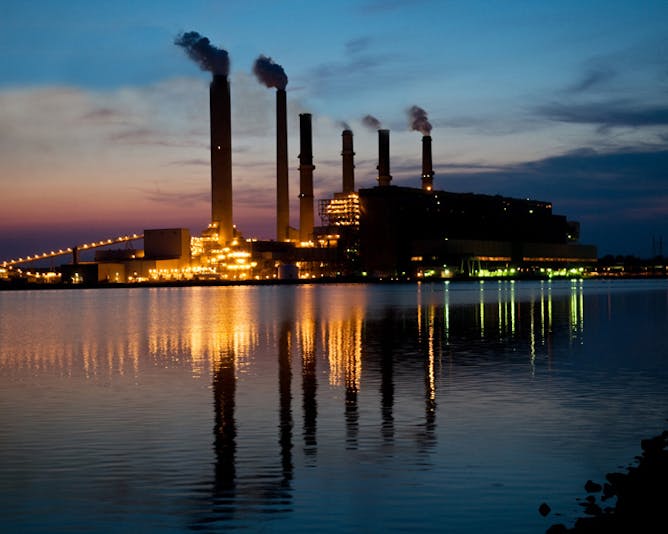Editor's note
|
|
When evidence surfaced in the 1970s that President Richard Nixon had plotted to cover up his involvement in the Watergate break-in, Republicans stood up and blocked his attempts to undermine the rule of law. Scholar Michael Koncewicz writes that the stories of these principled Republicans – when contrasted with the actions of Republican lawmakers overwhelmingly supportive of President Trump today – highlight a remarkable
transformation of the GOP.
Would you eat a burger made of meat grown in a laboratory vat rather than an animal’s body? Soon enough you will likely have the option – once the technology is perfected, the labeling is squared away and the price tag is affordable. Arizona State’s Walter Johnson and Andrew Maynard and Michigan State’s Sheril Kirshenbaum describe what polls are uncovering about public attitudes toward “cultured meat.” Consumer acceptance is the mystery ingredient in whether it’s going to be a success.
The EPA this week unveiled a proposal to slightly lower national carbon emissions and, at the same time, keep existing coal plants online longer. Daniel Fiorino from American University picks apart the arguments behind the plan to show how this move – as many other new environment policies – demonstrates how the Trump administration treats climate change as a “non-issue.” And scholar Joshua Pearce offers an
alternative vision for coal miners: training to transition to the solar business.
|
Naomi Schalit
Senior Editor, Politics + Society
|

|
|
Top stories
|

Atty. Gen. Elliot Richardson swears in William D. Ruckelshaus as his deputy. Both men later resigned rather than carry out Nixon’s order to fire the Watergate special prosecutor.
AP/John Duricka
Michael Koncewicz, New York University
Republicans in Congress today are different than GOP figures who challenged President Nixon during Watergate. GOP leaders now stand in contrast to those who once chose country over loyalty to one man.
|

Interested in a juicy burger grown in the lab?
Oliver Sjöström/Unsplash
Walter Johnson, Arizona State University; Andrew Maynard, Arizona State University; Sheril Kirshenbaum, Michigan State University
Cultured meat comes from cells in a lab, not muscles in an animal. While regulatory and technological aspects are being worked out, less is known about whether people are up for eating this stuff.
|

Rather than fade into the night, coal plants could stick around longer under Trump’s proposal.
Duke Energy
Daniel Fiorino, American University School of Public Affairs
Trump's energy plan may meet the letter of the law but the Affordable Clean Energy Plan reflects the administration's clear agenda to move slowly or not at all on climate change.
|
Environment + Energy
|
-
Joshua M. Pearce, Michigan Technological University
The Trump administration's Affordable Clean Energy Plan would help the declining coal industry, but a study shows many coal workers could transition to a new industry – solar – and earn more money.
-
Wanyun Shao, University of Alabama
Hurricane Harvey swamped much of Houston in 2017, causing more damage than all other US hurricanes except Katrina. But now the city is authorizing construction in zones at high risk for flooding.
|
|
|
|
|
|
Education
|
-
Norm Friesen, Boise State University
Although textbooks are often said to be on their way out, their usefulness in the transmission of knowledge suggest textbooks won't be obsolete anytime soon, the author of a book on textbooks argues.
-
Jenny Adams, University of Massachusetts Amherst; Michael Ash
An English and economics professor explains why America's college textbook industry might undergo radical change that makes books more affordable, similar to what happened in medieval times.
|
|
|
|
Trending on site
|
-
Frank T. McAndrew, Knox College
A number of factors – from our eagerness to place trust in people to our overconfidence in our own intelligence – make us easy prey.
-
Jonathan Buonocore, Harvard University
Generating less electricity with fossil fuels could help save lives.
-
Katrina Kelly-Pitou, University of Pittsburgh
Bitcoin is often criticized for using up tons of energy. But its carbon footprint may not be that bad.
|
|
Today’s chart
|
-

 |
Jay L. Zagorsky
The Ohio State University
|
| |
| |
| |
|
|